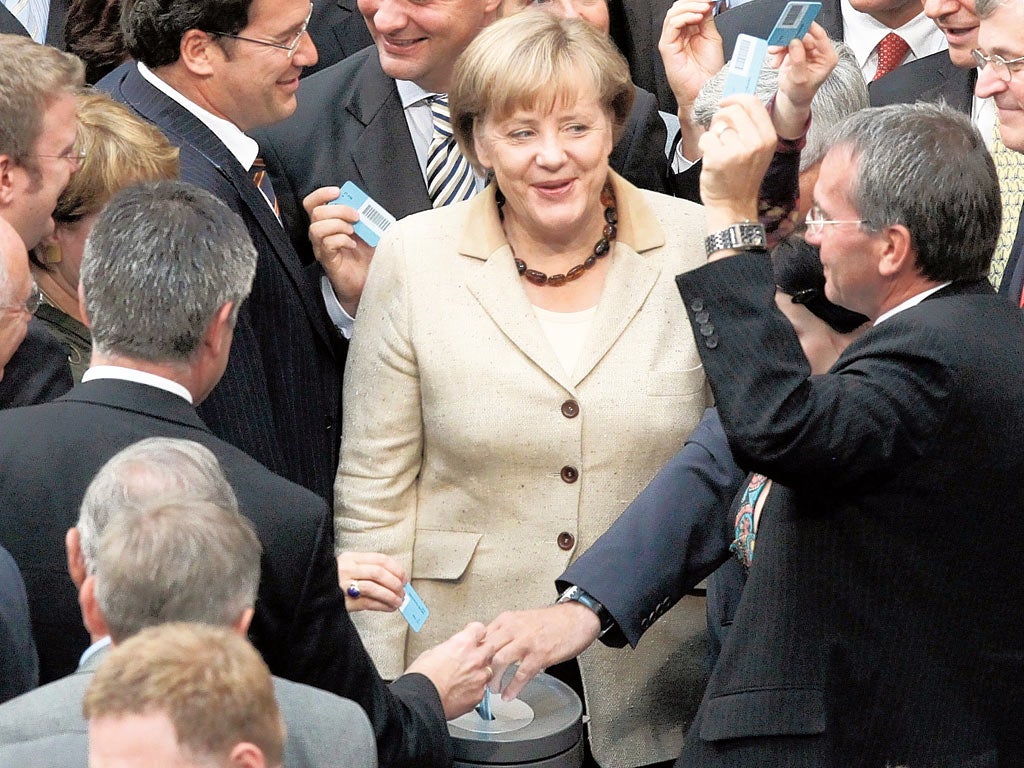Merkel breathes easily – for now – as MPs vote through EU bailout fund
Chancellor receives stronger than expected support from her coalition for bill which approves €211bn German contribution

Angela Merkel survived the biggest political challenge of her chancellorship yesterday after she narrowly defeated a rebellion within her government and won approval for a hugely unpopular new EU bailout fund.
In a significant endorsement of Ms Merkel's authority, her coalition of conservatives and liberal Free Democrats secured a majority of 315 in Germany's 620-seat parliament in a crucial vote ratifying expansion of the European bailout fund with some €211bn (£183bn) of German taxpayers' money.
Herman Gröhe, deputy conservative leader, welcomed the result, saying: "The large parliamentary majority clearly demonstrates that Germany is committed to the euro and to protecting its currency."
With an estimated 80 per cent of German public opinion against the expanded bailout, the measure had been strongly opposed by rebel conservative and liberal MPs within Ms Merkel's coalition and the Chancellor was not sure of obtaining a majority from her MPs until votes were finally counted.
In the event, 15 of her coalition's 330 MPs voted against her. Although the outcome of the vote was not in doubt because opposition parties had agreed to back Ms Merkel, political observers had warned that failure to win a majority from her own MPs, would have put the future of her government at stake.
"This is a huge weight off my heart," Peter Altmaier, the conservatives' chief whip, said. "It sends a strong message to Europe, the markets, the US, to everyone."
Dissenters said the result showed that the EU was turning into a transfer union.
Yesterday's vote took place just 48 hours after the Greek Prime Minister George Papandreou flew to Berlin to appeal for German help to solve his country's crippling debt problem.
As MPs gathered in Berlin's Reichstag parliament yesterday morning, protesters were out in force in Athens, where the "Troika" of inspectors from the International Monetary Fund, the European Central Bank and the European Commission were due to arrive to assess Greece's progress in meeting its fiscal obligations to stem the eurozone crisis.
In the heated parliamentary debate before voting, Wolfgang Schaeuble, Ms Merkel's veteran Finance Minister, warned that failure to approve the package expanding the scope of the European Financial Stability Facility (EFSF) could threaten both the euro and the European Union.
"We are in an extremely difficult situation, because the nervousness on the financial markets is great and this nervousness can have its effects on real economies," Mr Schaeuble warned. "Nobody is taking this decision easily."
Ms Merkel's handling of the euro crisis has been widely perceived as inept by German voters. Opinion polls have consistently shown a large majority opposed to spending large tranches of taxpayers' money on rescuing failed eurozone countries such as Greece.
As a result, the Chancellor's conservative and liberal coalition parties have suffered a string of humiliating defeats in key state elections throughout Germany this year. In polling in city state elections in Berlin earlier this month, the liberals won only 1.2 per cent of the vote and failed to enter parliament.
Opinion polls conducted before yesterday's crucial vote suggested that Ms Merkel's coalition would be easily ousted from government.
Yesterday's vote approved increasing the lending capacity of the EFSF from €250bn to €440bn. Seven more of the eurozone's 17 members still have to ratify the measure.
From the debate:
Those in favour...
Guido Westerwelle, liberal Foreign Minister: "The message to our European partners is: you can rely on Germany."
Volker Kauder, conservative parliamentary leader: "We are making a decision for the future of our country and for the future of Europe."
Peter Altmaier, conservative chief whip: "It sends a strong message to Europe, the markets, the US, to everyone."
... and those against
Frank Schaeffler, rebel liberal Free Democrat MP: "Expanding the bailout fund will make the situation worse for Greece."
Klaus-Peter Willsch, rebel conservative: "We are lending money which belongs to our grandchildren."
Subscribe to Independent Premium to bookmark this article
Want to bookmark your favourite articles and stories to read or reference later? Start your Independent Premium subscription today.

Join our commenting forum
Join thought-provoking conversations, follow other Independent readers and see their replies